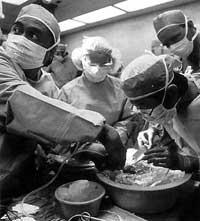Generosity of Basque citizens
1995/06/01 Elorrieta, Pilar Iturria: Elhuyar aldizkaria
The development of tissue and organ transplants has been intense and spectacular in recent years. In any case, 1994 was an important milestone in the Basque Autonomous Community. The physical and mental quality of life of patients has been significantly improved, new ways of social integration have been offered to them, and waiting lists have been translated into Health Organizations at inevitable lows.
However, the shortage of organ donors remains the main factor that can curb transplant development. The direct consequence of this is all the campaigns that are being carried out to inform and raise awareness of society, because, in short, those of us who are part of society are the only owners of our bodies and, consequently, it is in the hands of all of us to turn this small transplant militia into a tangible reality.
What has been achieved so far is a direct consequence of several factors. On the one hand, fruit of the generosity and solidarity of the citizens, a fundamental attitude for our relatives to remain alive. On the other hand, the consolidation of collaboration between medical professionals who perform the detection and monitoring of organ donors and those who develop transplant and extraction processes has also been a great achievement.
In addition to professionals who deal directly with this, there are support groups. Non-sanitary personnel of the hospitalization centers, SOS-DEIAK or Ertzantza, personnel and airport institutions, forensic, judges and courts, media, Alcer-Euskadi and territorial entities, addresses of the different hospital departments and Health.
We are more and more. The number of organ and tissue donors provided by the Transplant Coordination Group has increased by 60% since 1992.
On the contrary, the relationship between real and potential donors has been reduced, increasing cases of family rejection or contagious viral infections, 1.5% and 10% respectively. However, the donation rates in the Autonomous Community of the Basque Country are very high, higher than those in most countries of the world (according to data from PMP, CAPV: 92.7% Austria: 72%; Spain: 65.2% France: 51.3%; Sweden: 43.4% United Kingdom: 41.1% and Germany: 39.7%).
The donor effort is not at all left. To understand the evolution of transplants in the Autonomous Community of the Basque Country, we can cite the study carried out in each section.
For example, 123 kidney transplants (PMP/58.9%) have been performed, reaching a global peak level. This has led to the incorporation of a graft in 56% of patients suffering from kidney failure. There were 13 heart transplants (PMP/6.2%) and 30 liver transplants (PMP/14.4%). In other words, in the last four years 50 Basques have received a heart transplant and 95 have received a liver transplant. 196 cornea transplants (PMP/93.8%) were performed, with a state rate of PMP/43% in 1993. Unlike elsewhere, obtaining and integrating bones for transplantation is fully consolidated. Along with this, the cover of four donors has been collected, which has allowed to meet the needs of the community and send it to Hospital La Paz in Madrid. Finally, 35 bone marrow transplants (PMP/ 17%) were performed at the Hospital Nuestra Señora de Arantzazu.
Citizen collaboration is essential to carry out transplants. To say that the echo that is being collected in the ACBC is meritorious is not a pride. Thanks to this and the other agents involved, for example, the waiting lists of PMP for liver transplants are smaller than anywhere else. Although the list of people who need kidney transplantation is longer, it can be said that heart transplantation remains stable.
All this is possible thanks to donors. We want to say something to the donor who is still alive by the will to donate organs or to the relatives who express their solidarity with others in the face of death: Thank you.

Gai honi buruzko eduki gehiago
Elhuyarrek garatutako teknologia





